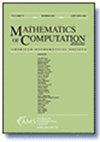对称群字符表中零点的大规模蒙特卡罗模拟
IF 2.1
2区 数学
Q1 MATHEMATICS, APPLIED
引用次数: 0
摘要
本文简要报告了最近进行的一些大规模蒙特卡罗模拟,用于近似大型对称群特征表中的零点密度。以前的计算表明,经典的消失结果无法解释很大一部分零点。而我们的计算结果与之前的结果大相径庭,表明事实恰恰相反。事实上,我们根据经验发现,几乎所有的零都属于单一经典类型。本文章由计算机程序翻译,如有差异,请以英文原文为准。
Large-scale Monte Carlo simulations for zeros in character tables of symmetric groups
This is a brief report on some recent large-scale Monte Carlo simulations for approximating the density of zeros in character tables of large symmetric groups. Previous computations suggested that a large fraction of zeros cannot be explained by classical vanishing results. Our computations eclipse previous ones and suggest that the opposite is true. In fact, we find empirically that almost all of the zeros are of a single classical type.
求助全文
通过发布文献求助,成功后即可免费获取论文全文。
去求助
来源期刊

Mathematics of Computation
数学-应用数学
CiteScore
3.90
自引率
5.00%
发文量
55
审稿时长
7.0 months
期刊介绍:
All articles submitted to this journal are peer-reviewed. The AMS has a single blind peer-review process in which the reviewers know who the authors of the manuscript are, but the authors do not have access to the information on who the peer reviewers are.
This journal is devoted to research articles of the highest quality in computational mathematics. Areas covered include numerical analysis, computational discrete mathematics, including number theory, algebra and combinatorics, and related fields such as stochastic numerical methods. Articles must be of significant computational interest and contain original and substantial mathematical analysis or development of computational methodology.
 求助内容:
求助内容: 应助结果提醒方式:
应助结果提醒方式:


